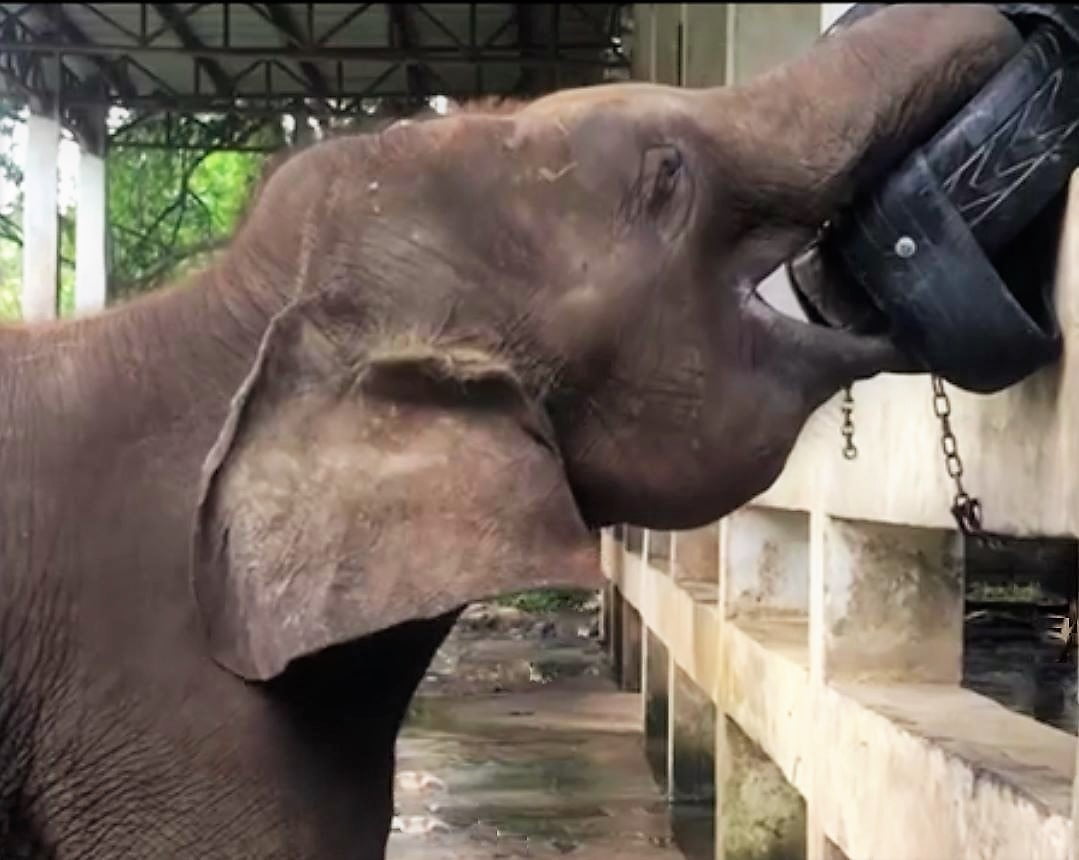Elephant Education at Lok Kawi Wildlife Park
In continued collaboration with Lok Kawi Wildlife Park, the Wild Welfare team have recently returned from their regular scheduled visit to Sabah.
In March, Dave Morgan, Field Director of Wild Welfare, and Margaret Whittaker, Executive Director of Wild Welfare (U.S.) returned to the wildlife park where they have been offering bespoke guidance and assistance for several years. The primary focus of this visit was to build on previous tuition with care staff in positive reinforcement training and protected contact management for the elephants.
Protected contact is a system for managing elephants which uses positive reinforcement training (PRT) as the primary method to modify behaviour. Voluntary cooperation of the animal is gained through the use of rewards, and positioning is directed by targets with trainers functioning outside of the elephant social hierarchy. This gives the elephants more choice and control over their lives and is ultimately safer for the care staff.
The 14 elephants at the facility, as with all captive elephants in Sabah, are rescue animals as a result of human/elephant conflict issues such as poisoning. Because of this, there is no chance for these elephants to be returned to the wild which is why their life-long care and welfare is so critical.
The elephant caregivers at the Kota Kinabalu-based wildlife park attended demonstrations and practical workshops hosted by the Wild Welfare team, including the introduction of “The Training Game.” This is where care staff train one another in order to understand not only the mechanics of PRT but also to gain increased empathy and insight into what it feels like to be trained.
“Listening to what an animal is telling you, and changing your actions accordingly is an essential aspect of providing good welfare as an animal caregiver.” Dave Morgan, Field Director, Wild Welfare.
Attendees of the workshops demonstrated a dedication to the advancement of their knowledge and application of the protected contact management system. However, it wasn’t just the people of Lok Kawi learning new skills from the Wild Welfare team, but the elephants as well. Dave and Margaret worked on advancing the behaviours of the elephants and spent time talking with care staff about their thoughts and feelings on the training. The care team enjoyed seeing how engaged the elephants can be during a training session, and seeing them think and problem solve in response to the positive reinforcement exercises.
“It became difficult to tell if it was the elephants or the staff who were more excited about the training and interactions!” Margaret Whittaker, Executive Director, Wild Welfare (U.S.)
Elephants are intelligent animals therefore training an individual for co-operative care can provide cognitive stimulation as well as ease of management. The behaviours being trained included stationing, where the elephant is asked to remain in a particular area of their enclosure, or presenting a body part to enable care staff to conduct health observations.
Once the elephant management facilities at Lok Kawi have been improved, a process which is currently underway, this foundation of training will facilitate more advanced behaviours in the future, such as conscious blood draws, comprehensive foot care, and other veterinary procedures.
In addition, the Wild Welfare team have been providing guidance on environmental enrichment to ensure the elephants are given natural behavioural opportunities. These include tyres to spar with and foraging opportunities within their enclosures.
The visit and training provision are part of an ongoing scheduled programme by Wild Welfare (U.S.) sponsored by The Elephant Sanctuary in Tennessee to empower the care staff in the best possible care for their elephants.

The Lok Kawi team making enrichment devices for the elephants.
~ENDS~
Notes to Editors
For more information or interview requests please contact Wild Welfare on communications@wildwelfare.org
Wild Welfare is a global organisation committed to improving animal welfare for captive wild animals. By uniting the world’s leading zoos, zoo associations and animal welfare organisations, we build trusting partnerships that help provide long-term solutions to critical wild animal welfare issues.
Our vision is to end the suffering of captive wild animals around the world and ensure full and sustainable protection is given to all animals in human care. Find out more at wildwelfare.org. Registered charity in England (no.1165941).





